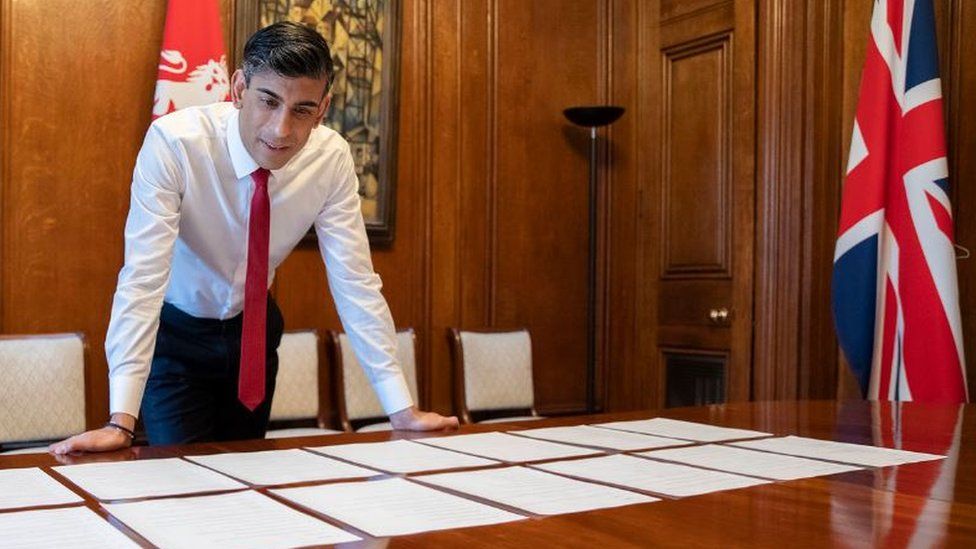 Image: HM Treasury (2022), https://www.bbc.co.uk/news/uk-politics-60838493
Image: HM Treasury (2022), https://www.bbc.co.uk/news/uk-politics-60838493
By Tommaso Rabitti, Third-year International Relations student at King’s College London and Editorialist at Res Publica
As Britons bask in soaring temperatures, many are saying ‘Spring is here!’ The unexpected, but much welcomed, early arrival of Spring, brought excitement on one side of the House of Commons, and lengthy criticism from the benches opposite.
The Chancellor’s Spring Statement, a mini-budget of sorts, set out the government’s plan to navigate the economy through rising inflation, the domestic cost of sanctions on Russia and a cost of living crisis. Rishi Sunak announced plans to cut fuel duty by 5p per litre until March next year, slash VAT to zero for homeowners installing energy-efficient materials, cut the basic rate of income tax from 20% to 19% from 2024, and increase the income threshold from which you start paying national insurance to £12,570 in July. The Chancellor also laid out immediate action to help relieve the cost of living by creating a £1bn fund to support lower-income households with increased costs, as well as increasing the Employer Allowance – which helps smaller businesses – from £4000 to £5000.
Sunak’s statement is a delicate balancing act aimed at alleviating the cost of living while shepherding the UK economy through a minefield of inflation, growing discontent and previous tax hikes. The new plans pledge significant tax cuts after the surge in spending caused by the pandemic prompted the Chancellor to raise National Insurance from 12% to 13.25%. Today’s announcement partially backtracks that higher tax by increasing the threshold from which people pay National Insurance.
Sunak made it clear that he wants to restore the image of the Conservative Party as the party of tax cuts. This statement is a bold attempt at keeping that promise. Indeed, Sunak’s speech to the House contained many of the core principles of Conservative economic policy. The Chancellor stressed, for example, the care that had been exercised by the Treasury in making sure that all measures were proportionate and, crucially, fiscally responsible. Being a motto of Conservative governments for decades, fiscal responsibility is a principle dear to Rishi Sunak. Throughout the statement, Sunak said how it was thanks to his proportionate measures that the UK was able to avoid further indebtment and keep improving the state of public finances.
Labour’s Shadow Chancellor, Rachel Reeves, however, was not impressed. The opposition has criticized Sunak’s plan saying that it “fails to appreciate the scale of the challenge we face”. For the Labour Party, more immediate relief measures were needed. This statement should have been a chance for Sunak to scrap his previous National Insurance hike. Rachel Reeves accused Sunak of living in Alice in Wonderland’s underworld – or ‘Sunakland’ as she calls it – where things are not quite as they seem: tax cuts mean tax increases, and Sunak inhabits a reality of his own.
With the country in an inflationary gap, current estimates report inflation at 6.2%, and the Bank of England raised interest rates to 0.75%, together with a declining growth forecast, Sunak must avoid stagflation. This may be the reason why much of his plan focused on limiting government spending and indebtment to instead rely on tax cuts, however minor, to help people keep more of their earnings.
Conservative economic policy always faces a challenge during times of crisis or uncertainty. The need to balance a principled approach of ‘low spending – low taxes’ with the immediate government expenses necessary to tackle the effects of crises. Sunak currently stands in this quagmire — and seems conscious of it. Johnson’s government is engaged in a difficult enterprise: leading the country out of COVID and into an age of economic growth, while reacting to a number of crises — from the war in Ukraine, and its consequences, to reforming funding for the NHS and the transition to net-zero. The Spring Statement is a testament to the long road ahead as Sunak pledged tax cuts and reforms that will not come into effect immediately, some not until 2024.
For this Conservative government to write in its next manifesto that they are still the party of high growth and low taxes, requires finding a new vision. A vision strong enough to chart coherent policy, but flexible enough to adapt to unexpected shocks. Clouds are gathering on the horizon. Sunak’s plan may be just enough to weather the storm.